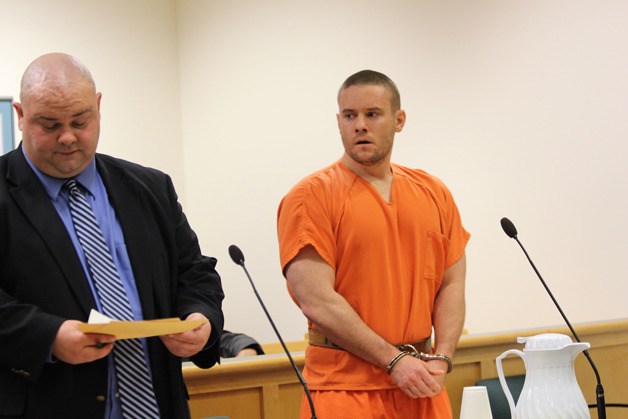A suspected South Whidbey burglar has inspired a bill in Olympia that would make jail mug shots available for disclosure to the public.
Garrett J. Edwards, a 30-year-old Clinton resident, was recently transferred from a state prison and appeared in Island County Superior Court Monday. He pleaded not guilty to charges of first-degree burglary, first-degree theft, two counts of theft of a firearm, trafficking in stolen property and possession of heroin.
Edwards is accused of burglarizing a Freeland home on Feb. 28, 2014. He allegedly kicked open a door and ransacked the house, stealing guns, jewelry and electronics. He was arrested after a deputy discovered that he had pawned some of the stolen items at a shop in Lynnwood, according to court documents.
The victims of the burglary, Rod and Carol Mourant, knew there was a suspect and asked the Island County Sheriff’s Office or the prosecutor for a mugshot but were denied. In frustration, they reached out to state Rep. Dave Hayes, R-Camano.
Hayes, a deputy in Snohomish County, explained that, under state law, jail booking photos can only be released to the public for “investigative purposes.” In general, the Island County Sheriff’s Office and the Oak Harbor Police Department don’t release booking photos unless the suspects are wanted on warrants.
After speaking with Island County Sheriff Mark Brown, Hayes proposed House Bill 1723, which would allow booking photos and electronic images to be available to the public.
Hayes said his main concern was for victims of crimes, like the Mourants.
“I don’t see this as a big, complicated issue,” he said. “I think it will offer peace of mind to the public.”
The Mourants testified in favor of the bill during a hearing of the House Public Safety Committee earlier this month, according to a press release from the House Republicans.
“We investigated every noise within our house and outside. We watched every vehicle that drove past. We watched every individual who walked down our private road. We were living in fear,” Rod Mourant testified.
“So we continued living at home,” he added, “hearing noises and watching people, and we don’t even know what this person looks like, even if he walked to our front door.”
Roland Thompson of the Washington Newspaper Publishers Association testified in support of the bill. He said Washington is only one of two states west of the Mississippi River that doesn’t allow full access to booking photos.
Hayes said the American Civil Liberties Union testified against the bill, citing privacy concerns.
A substituted version of the bill passed the committee Feb. 20. Under the changes, booking photos can be released to the public only after charges are filed and the defendant is arraigned in court. In addition, the police or prosecutor can determine that a photo should not be released if it would impede an investigation.
Undersheriff Kelly Mauck said he would support the bill. He said making the images available to the public wouldn’t be a lot of work since the rest of the booking information is already public.
In addition, he said there are times when releasing booking photos could help the police.
As for Edwards, he’s being held in jail on $150,000 bail and could face more than 10 years in prison if a jury finds that he committed the crimes with “aggravating circumstances” related to his lengthy criminal history, according to court documents.



